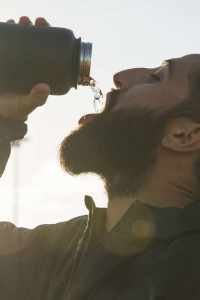How long can you go without water?
How long can humans survive without water? How much water do you have to drink at least daily in order to survive?
Table of Contents
That is how long you survive with out water
A general assessment is that a young and healthy person can survive between 3 to 4 days without water. In extreme cases, people have survived a whole week or 9 and up to 11 days without drinking water.
After the mining accident in Lassing (Austria) in the summer of 1998, a miner survived almost 10 days without eating or drinking. However, this extreme length of time can be regarded as an exception.
According to biology professor, Randall K. Packer of George Washington University, the maximum time anyone can go without water is one week. So the maximum duration of 7 days. This figure relates to estimates based on observations made on the dying.
Factors for survival time with out water
How long someone can go without water without dying depends on a number of circumstances.
The minimum daily requirement of drinking water for an average adult is between 0.6 and 2 liters.
Humans cannot store water for long, which is why it has to be replenished over and over again. Older people can also store around 10% less water in their cells than young people. Therefore, older people have to drink more regularly than younger people in order to have the same survival time in case of H2O shortages.
We lose more body fluids when we are under stress than when we are at rest. So we have to drink more in stressful situations. However, the most important factor related to H2O loss is temperature. If the temperature only rises by 1 degree Celsius, our water requirement also increases by at least half a liter.
Factors for survivals time with out water in the quick overview:
- temperature
- At high temperature: type of clothing, shade, or sun
- age
- stress
- Activity or rest
- Storage capacity of the H2O of the respective person
- Specific damage or previous illnesses (kidney problems)
- Wounds, bleeding (in the event of accidents, mining accidents)
Why don’t humans survivals with out H2O?
At least half or even up to two-thirds of us consists of H2O. This water is constantly needed for the body’s functions. Even when not in use, H2O must be available for this. In addition, absorbed H2O can only be stored in the body cells for a certain period of time.
If there is not enough H2O in the body, then body functions have to be reduced. When it is hot, the vessels also widen in order to be able to give off more heat. As a result, the blood flows through it even faster. This creates a vicious cycle when there is a lack of H2O combined with heat.
The first consequence of the lack of H2O is thirst. If this is not answered by drinking, then at some point you will feel dizzy and have headaches. If these symptoms are observed, heatstroke is not far away. So it should be acted immediately. But it is even better not to let it get that far in the first place.
10 tips for long survivals with out H2O
1. Prevention is the best survival strategy (H2O supply, drinking bottles, water filter)
2. Breathing with your mouth closed (if you open your mouth H2O is lost through evaporation)
3. Sufficient body coverage (less evaporation through the skin)
4. Avoid movement as much as possible (no exertion, no sweating)

5. Avoid stress (stress stimulates the body’s functions, which means that more H2O is required)
6. If available, drink water in small sips
7. If there is absolutely no H2O left, also refrain from eating (requires H2O for digestion)
8. Close bleeding wounds as soon as possible
9. Stimulate salivation by chewing on a piece of gum (with your mouth closed)
10. Try to reduce all body functions: do not move, excite, think/try to sleep (the brain also needs water when thinking)
Also read: how to transfer from iPhone to iPhone


